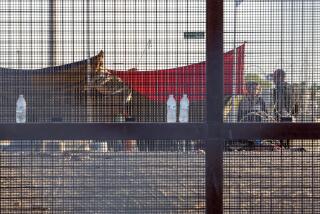For migrant families reunited under court order, the future remains uncertain
With more than 1,800 migrant families now reunified under a court-ordered deadline, the question turns to how fast immigration authorities can deport those with final orders of removal.
It looks increasingly likely those families will remain in limbo, at least for now.
Lawyers with the American Civil Liberties Union have asked U.S. District Judge Dana Sabraw in San Diego for a seven-day reprieve for all parents to consult with their children and attorneys to determine if there is any further recourse. That could result in a parent deciding to leave a child in the U.S. to fight an asylum case alone.
But the judge seemed reluctant to grant such a blanket delay. Instead he focused on a narrower subset of parents who might have just been reunited in the last day or so, or the 120 parents who waived their right to reunification but may have been confused.
Currently, about 300 reunified families are being detained in a pair of facilities in Texas, and 1,100 families have been released on parole into the community while their immigration cases are pending, government attorneys in the San Diego case said. Another 145 parents are also detained, but without their children due to ineligibility such as criminal records.
About 1,000 families have executable orders of removal.
But the families at imminent risk of being deported are the ones in detention with travel documents already prepared — a group that government lawyers could not immediately quantify during a Friday hearing.
Sabraw halted family deportations nearly two weeks ago to hear more argument on the issue, and now he expects to rule over the weekend.
The hearing Friday afternoon was the first following the one-month deadline Sabraw had set to reunify the more than 2,500 children age 5 and older separated at the border. About 57 children under 5 were reunited under an earlier deadline.
“The government deserves great credit,” Sabraw said, applauding the massive undertaking. But he also blamed the government for its lack of foresight and communication in implementing its hardline stance on criminally prosecuting illegal border crossings, saying “the government is at fault for losing several hundred parents in the process.”
The parents he’s referring to include the more than 400 who are believed to have been deported without their children and were not able to be reunified by the deadline. At least 35 other parents have been released from immigration custody into the U.S. and still have not been located.
Those parents will be the focus of the next chapter in the legal challenge to the family separations. Sabraw on Friday urged the government to identify and locate those parents as quickly as possible for reunification.
How that will happen, however, is the subject of dispute.
The ACLU lawyers have offered to utilize a vast network of advocacy groups to help find the parents around the world — mostly in Central America — but are asking for as much detail as possible from government immigration files to aid in the detective work. Those might include the name of a relative, an address or a destination mentioned to a case worker.
Deputy Assistant Atty. Gen. Scott Stewart countered that a court order to produce such data would be overly burdensome and detract from the effort to reunify families.
“We want to move as swiftly as possible,” Stewart assured the judge.
In a phone call with reporters a day earlier, a U.S. Department of Homeland Security official contended that many, if not all, of those previously deported parents were given the option to reunite with their children before removal but gave up that right knowingly, apparently believing it was in the child’s best interest.
But ACLU attorney Lee Gelernt questioned that reasoning, pointing to affidavits filed Wednesday from pro-bono attorneys working in detention centers along the Southwest border who have found at least 27 parents who said they unknowingly signed away their right to reunification.
The attorneys described parents who had little to no time to speak with their children, who didn’t understand the legal documents they had been asked to sign — sometimes due to language barriers or their inability to read and write — and who were confused over their own immigration cases.
Aaron Reichlin-Melnick, a New York attorney at the American Immigration Council, supervised a team of volunteers who’d interviewed more than 90 parents in Texas detention facilities since last week, including 52 who’d been identified as having waived reunification with their children.
“Many of these individuals indicated that they felt coerced into relinquishing their rights,” he wrote in an affidavit. “Still others appeared totally unaware that they had done so. Indeed, some individuals were adamant that they had signed a paper that said they chose to be reunited with their children.”
Problem is, many of the parents said they were not given copies of the forms, leaving attorneys unable to immediately verify what had actually been signed, the affidavits said.
Gelernt argued the affidavits were evidence for the need for a seven-day waiting period before reunited families can be deported.
But Sabraw pointed to a 48-hour notice form that clearly lays out a parent’s options and noted that many families reunited over the past few weeks have had long enough to figure out their next steps.
He also questioned if continuing to stay removals falls within the scope of the case, which at its core is about reunification, not affording a parent greater time to then decide whether to re-separate.
Going forward, Sabraw also warned the government that the case is not over after the reunifications.
“This problem cannot repeat,” Sabraw warned. He said criminal prosecution of illegal border crossings will continue, and families will be separated as a result.
In what he sees as a Stage 3 to the litigation, the judge indicated he will require a future process that ensures government agencies share information, track parents and children better, and have a plan to reunify them once the criminal prosecution is finished.
Under the terms of a 1997 court settlement called the Flores agreement, which limits the amount of time children can be held in immigration custody, parents in detention will have the option to stay with their child in a family facility or to release their child to a shelter or the care of a sponsor.
The conditions of family detention centers will also be more closely monitored.
On Friday, a Los Angeles federal judge in the Flores case said she will appoint an independent auditor to oversee the treatment of children in immigrant detention facilities.
Peter Schey, lead counsel and director of the Los Angeles-based Center for Human Rights and Constitutional Law, said the monitor will oversee all three family detention centers run by Immigration and Customs Enforcement — two in Texas and one in Pennsylvania — as well as Border Patrol facilities in the Rio Grande sector along the Texas border.
Schey’s group filed a scathing report last week that included testimony from more than 200 parents and children held in California, Texas and other states who described cramped cells without enough bedding, cold or frozen food and a lack of basic hygiene products.
A Mexican woman said her daughter had wet herself on their first night because there were so many people sleeping in the room that she couldn’t get to the toilet. A Guatemalan boy told attorneys that he had no soap, towels or toothbrush.
“These are problems that appear to be pervasive,” Schey said Friday. “We’re hoping that that has a salutary effect on Border Patrol operations throughout the southern border. Hopefully they won’t wait until we bring a new motion to expand the special monitor before they will learn from this and correct their ways.”
The interviews were done through a 1997 court settlement called the Flores agreement that governs how long migrant children may be held in custody and under what conditions. The settlement allows attorneys to periodically inspect detention facilities that children are held in.
This month, U.S. District Judge Dolly Gee rejected the federal government’s request to renegotiate the terms of the Flores agreement to hold children for longer than 20 days.
She ruled in 2015 that the government had breached the agreement by allowing rooms that were cold and overcrowded as well as inadequate nutrition and hygiene.
More to Read
Sign up for Essential California
The most important California stories and recommendations in your inbox every morning.
You may occasionally receive promotional content from the Los Angeles Times.











